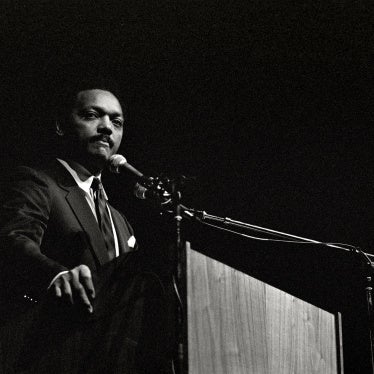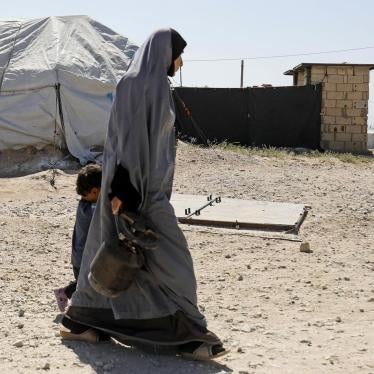We are writing to urge you to grant clemency to Juan Raul Garza, who is scheduled to be executed Tuesday, June 19, and to commute his death sentence to life imprisonment.
Mr. Garza was convicted of murdering one person and ordering the killing of two others. While he should certainly be held accountable and punished for his crimes, we support clemency for him because all state-sponsored executions are inherently cruel and violate fundamental human rights. In addition, Mr. Garza's execution, if carried out now, would violate the government's obligation to ensure that all criminal punishments are sought and applied fairly, with reasonable uniformity, and without intentional or unintentional bias or discrimination. There can be no justification for proceeding with an execution when serious questions about the fairness of the federal death penalty system remain unresolved.
Last September, the Department of Justice released the results of its initial inquiry into the administration of the federal death penalty, documenting stark racial and geographic disparities: 80 percent of the cases submitted by federal prosecutors for death penalty review during the five-year-period studied involved racial minorities as defendants and fewer than ten percent of federal districts accounted for some 43 percent of prosecutorial recommendations of the death penalty. Last December, President Clinton granted Mr. Garza a temporary reprieve until June 19, 2001 to give the Department of Justice time to explain those disparities. Currently, of the twenty prisoners on federal death row, seventeen are members of minority groups.
On June 6, the Justice Department issued a supplemental report concluding there was no evidence that minority defendants are subjected to bias or otherwise disfavored in decisions concerning capital punishment. That conclusion was not supported by the data in the report. Indeed, the report notes the impossibility of acquiring the data necessary for a comprehensive assessment of the fairness of the federal death penalty in the six-month period established by President Clinton. Your response should therefore be an extension of Mr. Garza's reprieve and a delay of all federal executions until such time as a proper and complete study can be completed.
For example, it is impossible to make any sound conclusions about the origins of high proportion of minorities among federal capital defendants when the Justice Department lacks racial information on the pool of death-eligible federal defendants. Federal prosecutors have great discretion to select defendants for federal capital prosecution. It is not possible to know whether the exercise of that discretion has led to unjustified racial disparities without knowing the race and crime of those they chose not to select, as well as of those whom they selected. We also note that the department's June 6 report argues that race-of-defendant discrimination does not exist, but does not consider race-of-victim discrimination, even though the earlier Justice Department report did document disparities on the basis of the victim's racial background. The new study also fails to evaluate the gross geographic differences in federal prosecutors' use of the death penalty or to evaluate the decision-making process by which some federal defendants are offered plea bargains that would spare them the death penalty and others are not.
The June 6 report suggests a reason for the disproportionate number of minorities on death row: that drug-trafficking organizations that engage in violence are disproportionately composed of members of minorities. The report does not, however, provide a breakdown of how many of the federal defendants for whom authorization for the death penalty has been sought or given committed murders connected to gangs or trafficking organizations. We note that of the twenty people currently on federal death row, only seven appear to have committed capital crimes connected to gangs or drug-trafficking. Nor does the June 6 report provide any substantiation for its claim about the racial composition of drug organizations that engage in violence. On its face, the claim seems inconsistent with federal data showing that whites commit more than 32 percent of all drug-related homicides and 56 percent of gang-related homicides. Finally, the June 6 report offers no data indicating whether the Department of Justice pursues the death penalty against white organized crime defendants who commit murder as frequently as it does against minorities who commit gang-related violence. The need for such comparative data is underscored by the fact that lawyers for Mr. Garza have compiled a list of scores of cases in which either no authorization for the death penalty was sought or pleas bargains were accepted for whites who committed murders in connection with criminal enterprises.
We are troubled by the apparent conclusion of the June 6 report that there is no racial inequity in the administration of the federal death penalty because there is no evidence of discriminatory intent or actual bias on the part of federal prosecutors. The United States is, as you know, a party to the International Convention on the Elimination of All Forms of Racial Discrimination (CERD), an international treaty that prohibits practices that have the purpose or effect of discriminating on the basis of race. It requires remedial action whenever there is an unjustifiable disparate impact upon a racial group even in the absence of racial animus. It is thus not enough to find prosecutors are not motivated by racial considerations. Given the racial disparities that have been documented in the federal death penalty system, the department has the obligation to affirmatively establish that those disparities can be justified and that there are not alternative ways of pursuing the department's mission that would not have such a racially disparate result.
Finally, we note that Mr. Garza's death sentence arose from sentencing hearings marked by prosecutorial misconduct and procedural flaws. The jurors in his case were informed of Garza's alleged criminal behavior in Mexico, even though he was never arrested or prosecuted-much less convicted-for those crimes. In April, the Inter-American Commission on Human Rights of the Organization of American States (OAS) found that this action had violated Mr. Garza's human rights, and recommended that the U.S. provide Garza with an effective remedy, including commutation. Permitting the execution of a man whose sentencing was marked by such unfairness cannot be squared with the national commitment to justice.
Human Rights Watch opposes capital punishment in all circumstances because of its cruel and inhumane nature. The cornerstone of human rights is respect for the inherent dignity of all human beings and the inviolability of the human person. These principles cannot be reconciled with the death penalty, a form of punishment that is unique in its barbarity and finality. The intrinsic fallibility of all criminal justice systems assures that even when full due process of law is respected, innocent persons may be executed. Mr. Garza's case is particularly troubling because the U.S. government is prepared to execute him even though it has not been able to satisfactorily explain why such members of minorities are disproportionately represented on federal death row.
We urge you to commute Mr. Garza's sentence to life imprisonment. In the alternative, he should receive a stay of execution until the Justice Department completes its promised comprehensive study of racial and geographic disparities in the use of the federal death penalty.
Sincerely,
/s/
Allyson Collins
Senior Researcher








